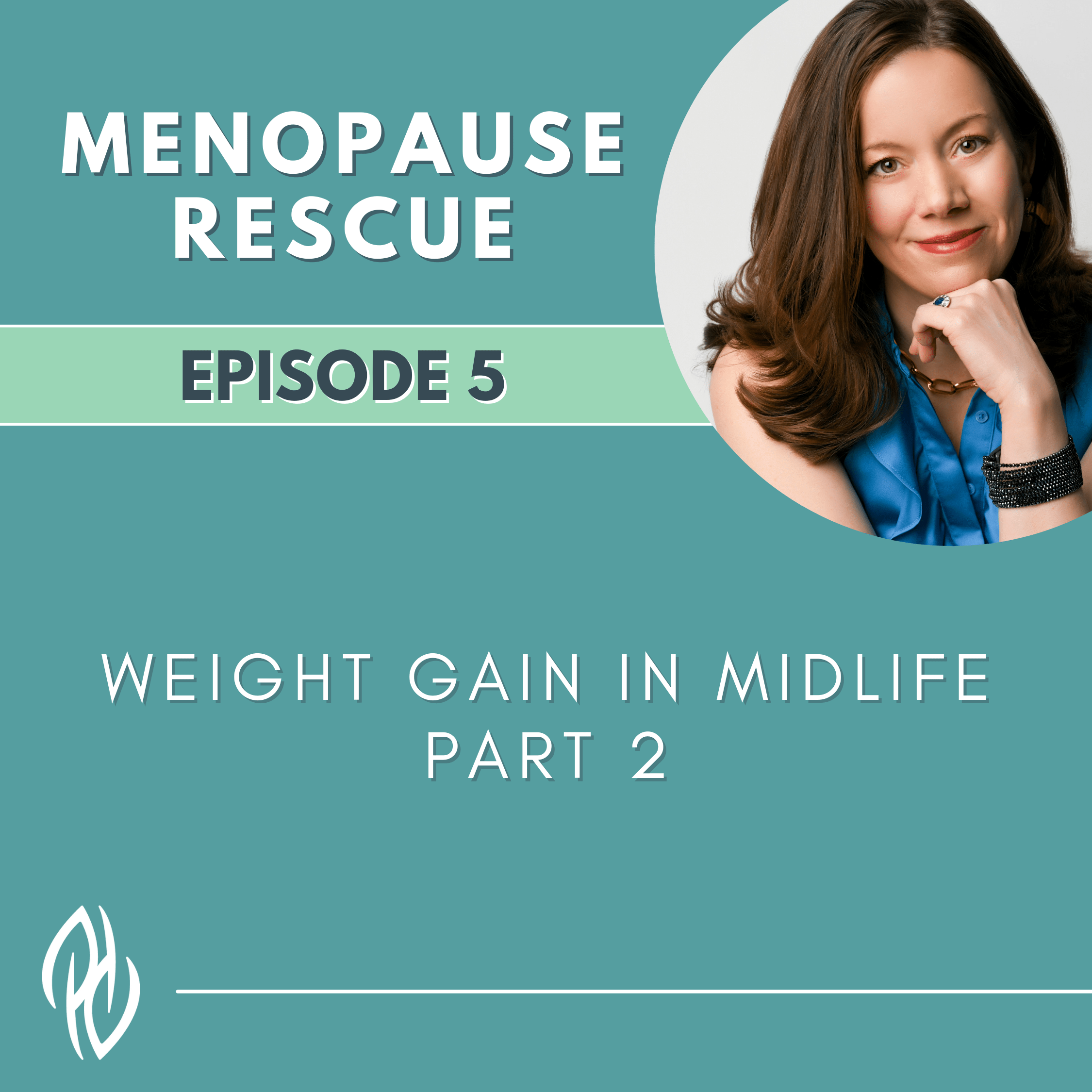Weight Gain in Midlife - Part 2
The impact of underestimating stress hormones, exercise habits, and sleep quality on managing weight during menopause.
Weight Gain in Midlife - Part 2
The impact of underestimating stress hormones, exercise habits, and sleep quality on managing weight during menopause.
“Midlife women are often caught up in a sea of symptoms,” says Dr. Polly Watson. “Too often, they’re overwhelmed by the lack of support from mainstream healthcare. They’re inundated with so-called experts who are selling solutions which may lack credibility.” Dr. Polly addresses the common mistakes and misconceptions related to weight gain in midlife women. She emphasizes the importance of personalized approaches to health and weight loss, debunking the myths of calorie restriction and macro tracking as universal solutions.
“I’ve seen plenty of women end up being depleted and exhausted by constant restriction.”
Highlighting the importance of adequate protein intake, Dr. Polly cautions against the pitfalls of excessive fasting and alcohol consumption. She highlights the often underestimated impact of stress hormones, exercise habits, and sleep quality on managing weight during menopause.
Watch Dr. Watson's Insightful Video:
Unlock the secrets of this insightful video with dynamic chapter markers, guiding you through every compelling moment of the discussion.
02:03 Fasting vs Metabolic Flexibility
03:25 Alcohol Consumption as Connection
05:45 Stress Hormones and Weight Loss Resistance
11:16 Restriction and Under Fueling
19:42 Sleep Issues
“Midlife women are often caught up in a sea of symptoms,” says Dr. Polly Watson. “Too often, they’re overwhelmed by the lack of support from mainstream healthcare. They’re inundated with so-called experts who are selling solutions which may lack credibility.” Dr. Polly addresses the common mistakes and misconceptions related to weight gain in midlife women. She emphasizes the importance of personalized approaches to health and weight loss, debunking the myths of calorie restriction and macro tracking as universal solutions.
“I’ve seen plenty of women end up being depleted and exhausted by constant restriction.”
Highlighting the importance of adequate protein intake, Dr. Polly cautions against the pitfalls of excessive fasting and alcohol consumption. She highlights the often underestimated impact of stress hormones, exercise habits, and sleep quality on managing weight during menopause.
By exploring ways to balance life’s stressors, Dr. Polly encourages her listeners to tune into their bodies and adapt their health strategies accordingly. She provides practical advice on evaluating the effectiveness of weight loss efforts, which includes tracking sleep patterns and leveraging technology such as continuous glucose monitors and the innovative Lumen device.
This episode is a call to action for women in midlife to prioritize self-care, acknowledge their distinct health needs, and eliminate unnecessary stressors. By making informed health decisions in consultation with healthcare professionals, they can go through a more personalized journey towards achieving optimal health and weight management during menopause.
Quotes:
- “Fasting can have a lot of benefits, but I think that many people do well with short periods of fasting and times where they’re allowing themselves to eat more. So we’re encouraging metabolic flexibility.” (03:25 | Dr. Polly Watson)
- “The other barrier I know that I see a lot of women struggle with is the relationship with stress hormones and weight loss resistance. So when our cortisol is high and our stress hormones are high, we’re going to become more insulin resistant. We’re going to kind of get that SpongeBob SquarePants look–the belly fat look. And we all need to have active stress management.” (06:20 | Dr. Polly Watson)
- “I’ve seen plenty of women end up being depleted and exhausted by constant restriction. To make matters worse, as they continue to restrict and restrict, they’re often not losing just fat mass, but they’re also losing lean muscle mass because they’re eating so much less; they’re not eating enough protein and they’re too tired to exercise. So if they do lose weight, they end up being less metabolically healthy than when they started because they’ve lost lean muscle. Your body is smart. As you continue to restrict calories, your body will adapt to use less fuel. So calories in, calories out isn’t good science. It’s not true. And eventually it can often lead to you gaining more weight back because you’re less metabolically healthy when you started.” (11:54 | Dr. Polly Watson)
- “There are some simple things we can look for that can help give us clues if we’re being a little too intense and we’re pushing too hard. The first one’s really basic. I would say: “what’s going on with your sleep? Are you sleeping through the night? Do you wake up feeling refreshed?” A lot of times when we start restricting carbs, when we start doing a lot more fasting, sometimes sleep gets disrupted. So if you’re really struggling with sleep after starting a new health-promoting behavior, I would argue that sleep is probably one of the most important things we can do for our health.” (20:04 | Dr. Polly Watson)
- “Give yourself permission to find a solution that works for you and give yourself permission not to keep beating your head against the wall and really pushing harder and harder and harder with something that may not be working. Maybe the solution is to do less.” (27:02 | Dr. Polly Watson)
Resources:
Meet the host!
Dr. Polly Watson is a board certified OBGYN who has additional training in menopausal medicine, sexual medicine and functional medicine.
She looks forward to sharing her knowledge with you to help find a solution to address the imbalance in your system and restore your health.
In 2019 I left my job as an employed physician with a large organization and started Hormone Wellness MD. I started with no staff working out of a single room. Since then, my staff has grown to a team of 5 and we’ve helped over 1,100 people on their health journey.

Meet the host!

Dr. Polly Watson is a board certified OBGYN who has additional training in menopausal medicine, sexual medicine and functional medicine.
She looks forward to sharing her knowledge with you to help find a solution to address the imbalance in your system and restore your health.
In 2019 I left my job as an employed physician with a large organization and started Hormone Wellness MD. I started with no staff working out of a single room. Since then, my staff has grown to a team of 5 and we’ve helped over 1,100 people on their health journey.





